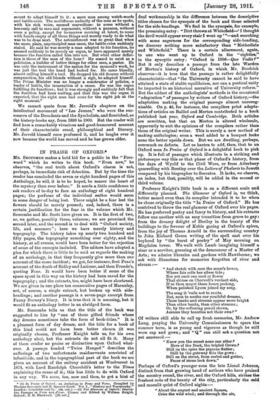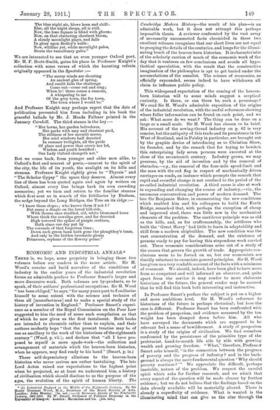IN PRAISE OF OXFORD.*
SECCOMBE makes a bold bid for a public in the " Fore- word " which he writes to this book. "Even now," he observes, "the real truth about Oxford's charm is not perhaps, in immediate risk of detection. But by the time the reader has concluded the seven or eight hundred pages of this Anthology, he will, it is to be hoped, be nearer the heart of the mystery than ever before." It needs a little confidence to ask readers of to-day to face an anthology of eight hundred pages; the perfume of the individual anthos would seem in some danger of being lost. There might be a fear lest the flowers should be merely pressed; and, indeed, there is a certain justification for the fear in the volume which Mr. Seccombe and Mr. Scott have given us. It is the first of two, or, we gather, possibly three, volumes; we are promised the second later, and the second is to deal with "Oxford society, life, and manners " ; here we have merely history and topography. The history takes up nearly two hundred and fifty pages, the topography something over eighty, and the history, at all events, would have been better for the rejection of some of the excerpts included. The editors have adopted a plan for which there is little to be said as regards the making of an anthology, in that they frequently give more than one account of the same incident ; we get, for instance, first Foxe's account of the death of Ridley and Latimer, and then Froude's, quoting Foxe. It would have been better if some of the space spent in this way on the history had been saved for the topography ; and the extracts, too, might have been shortened. We are given in one place ten consecutive pages of Macaulay, not, of course, a single extract, but broken up with side- headings ; and another passage is a seven-page excerpt from Fanny Burney's Diary. It is true that it is amusing, but it would fit an anthology better in an abridged form.
Mr. Seccombe tells us that the title of the book was suggested to him by "one of those gifted friends whose day dreams sometimes take the form of book-titles." It is a pleasant form of day dream, and the title for a book of this kind could not have been better chosen (it was originally chosen, Professor Knight tells us, for his own anthology also), but the extracts do not all fit it. Many of them confer no praise or distinction upon Oxford what- ever. A passage headed "Twice Hanged" describes the sufferings of two unfortunate maidservants convicted of infanticide, and in the topographical part of the book we are given an account of the railway accident at Woolvereot in 1874, with Lord Randolph Churchill's letter to the Times explaining the cause of it ; this has little to do with Oxford in any way. We seem, too, now and then, to get a hint of • (1) In Praise of Orford an Anthology in Prose and Verse. Compiled by Thomas Seccombe and H. Spencer Scott. Vol. I., " History and Topography." London : Constable and Co. COS. net..]—(2) Ph. Glamors, of Oxford: Descrip- tive Passages in Voss and, Pose. Chosen and Edited by William Knight. Oxford B. H. Blackwell. • [65. net.]
dual wthirmanship in the difference between the descriptive titles chosen for the synopsis of the book and those selected for the side-headings. We find in the synopsis, for example, the promising entry : "Dirt thrown at Whitefield—I I thought
the devil would appear every stair I went up' "—and searching with some eagerness for the corresponding side-heading, we discover nothing more satisfactory than "Methodists and Whitefield." There is a certain allurement, again, to one who went up to Oxford in the "eighties," in the synoptic entry : "Oxford in 1886—Quo Vadis?"
But it only describes a passage from the late Warden of Merton's history of Oxford, in which Mr. Brodrick observes—it is true that the passage is rather delightfully characteristic—that "the University cannot be said to have attained a state of stable equilibrium, nor can a poetical unity be imparted to an historical narrative of University reform."
But the oddest of the anthologists' methods is the occasional "adaptation" of passages by writers of Oxford history,—the adaptation making the original passage almost unrecog- nisable. On p. 46, for instance, the compilers print adapta- tions of articles on Balliol and Merton contributed to a book published last year, Oxford and Cambridge. Both articles are rewritten, but that on Merton is altered wholesale, apparently to snit the opinions of the compilers rather than those of the original writer. This is surely a new method of making anthologies; even a weed added to a bouquet looks none the better upside down. But we are dwelling, perhaps, overmuch on defects. Let us hasten to add, then, that to an Oxford man In Praise of Orford is a delightful book to pick up. It is full of passages which illustrate in a striking and picturesque way this or that phase of Oxford's history, from the days of Wyclif to the Civil Wars, or from Atterbury quarrelling with Bentley over the Letters of Phalaris to Jewett compared by his biographer to Socrates. It lacks, we observe, an index, but that, possibly, will be added in the second or third volume.
Professor Knight's little book is on a different scale and differently planned. The Glamour of Oxford is, we think, better named even than its compiler intended it to be when
he chose originally the title "In Praise of Oxford." He has contrived to throw the real glamour of Oxford over his pages. He has preferred poetry and fancy to history, and his extracts follow one another with an easy transition from grave to gay: from the dreamy delight of Shelley in the beauty of the buildings to the fervour of Keble gazing at Oxford's spires, from the joy of Thomas Arnold in the surrounding country to John Richard Green writing of the spell cast over his boyhood by "the burst of poetry" of May morning on Magdalen tower. We walk with Lamb imagining himself a sizar or a servitor, guessing at the demeanour of a Master of Arts ; we admire libraries and gardens with Hawthorne ; we ask with Shenstone for memories forgotten of river and stream :—
"And sketch with care the muse's bower, Where Isis rolls her silver tide; Nor yet omit one reed or flower That shines on Cherwell's verdant side, If so thou mayst these hours prolong, When polished Lycon joined my song.
The song it 'rails not to recite.
But, soon to soothe our youthful dreams, Those banks and streams appear more bright Than other banks, than other streams ; Or, by the softening pencil shown, Assume they beauties not their own?"
Of writers still able to call up fresh memories, Mr. Andrew Lang, praying the University Commissioners to spare the summer term, is as young and vigorous as though he still wore cap and gown; and "Q" can still ask a question not,
yet answered:—
"Know you the secret none can utter? Hers of the Book, the tripled Crown ?
Still on the spire the pigeons flutter; Still by the gateway flits the gown : Still on the street, from corbel and gutter, Faces of stone look down."
Perhaps of Oxford's younger sons the late Lionel Johnson, distinct from that growing band of authors who have praised
the country round, the river, and the Oxford hills, strikes the freshest note of the beauty of the city, particularly the cold
and moonlit quiet of Oxford nights :—
" About the august and ancient Square, Cries the wild wind; and through the air,
The blue night air, blows keen and chill: Else, all the night sleeps, all is still. Now, the lone Square is blind with gloom: Now, on that clustering chestnut bloom, A cloudy moonlight plays, and falls In glory upon Bodley's walls : Now, wildlier yet, while moonlight pales, Storm the tumultuary gales."
We are interested to see that an even younger Oxford poet, Mr. H. F. Brett-Smith, gains his place in Professor Knight's collection with some verses of which the haunting refrain originally appeared in the Spectator :7-
" The merry winds are shouting • An ancient glee of spring, And sunlit falls the challenge Come out—come out and sing; When lo there comes a rumour, A whispering to me Of the grey town, the fey town, The town where I would be."
And Professor Knight may perhaps regret that the date of publication prevented him from including in his book the graceful ballade by Mr. J. Meade Falkner printed in the January Cornhilt. The third stanza is the key :—
" Her lawns, her garden belvederes, Her parks with may and chestnut pied, The stillness of her moonlit meres, Her oriel windows half descried In summer twilights, all the pride Of place and power that crown her lot, Wisdom and youth beatified : Our Lady Oxford changeth not."
But we come back, from younger and older men alike, to Oxford's first and nearest of poets,—nearest to the spirit of the city, the life of its youth, the sunlight on its hills and streams. Professor Knight rightly gives to " Thyrsis " and
"The Scholar Gypsy" the space they deserve. Almost every line of them has been quoted again and again by writers on Oxford, almost every line brings back its own crowding memories ; yet we turn and return to the familiar stanzas which first sent us in search of the fritillaries' by Ensham, the sedge beyond the Long Bridges, the Tree on its ridge :— "I know these slopes ; who knows them if not I?
But many a dingle on the loved hill-side,
With thorns once studded, old, white blossomed trees Where thick the cowslips grew, and far descried High towered the spikes of purple orchises, Hath since our day put by The coronals of that forgotten time ; Down each green bank hath gone the ploughboy's team, And only in the hidden brookside gleam Primroses, orphans of the flowery prime."























































 Previous page
Previous page